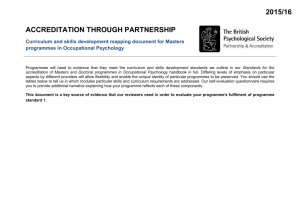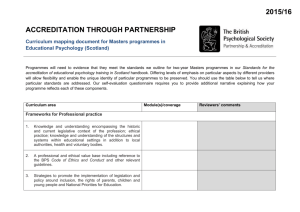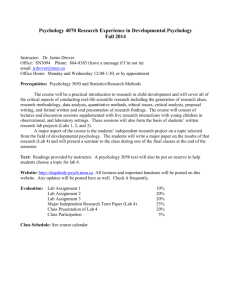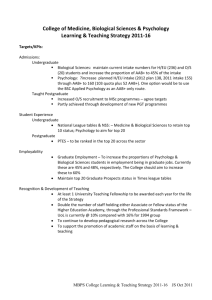Curriculum mapping document
advertisement
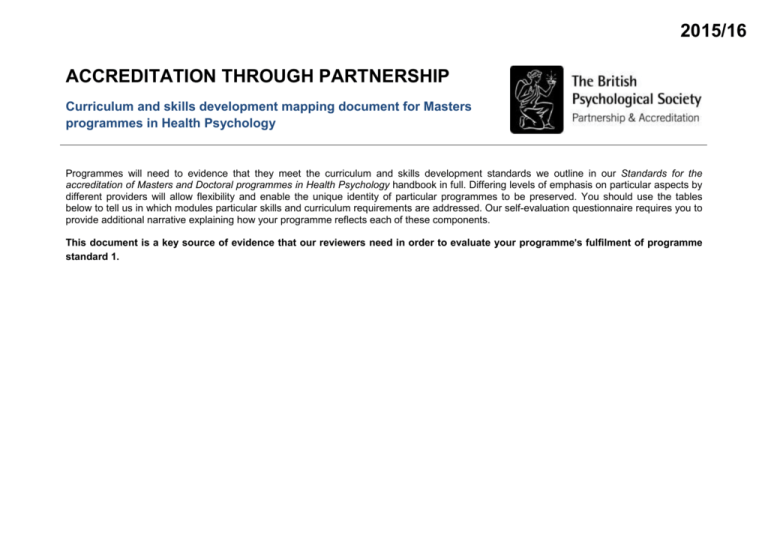
2015/16 ACCREDITATION THROUGH PARTNERSHIP Curriculum and skills development mapping document for Masters programmes in Health Psychology Programmes will need to evidence that they meet the curriculum and skills development standards we outline in our Standards for the accreditation of Masters and Doctoral programmes in Health Psychology handbook in full. Differing levels of emphasis on particular aspects by different providers will allow flexibility and enable the unique identity of particular programmes to be preserved. You should use the tables below to tell us in which modules particular skills and curriculum requirements are addressed. Our self-evaluation questionnaire requires you to provide additional narrative explaining how your programme reflects each of these components. This document is a key source of evidence that our reviewers need in order to evaluate your programme’s fulfilment of programme standard 1. Core skills Accredited programmes are expected to support their students’ development of a range of core and transferrable skills that are central to health psychology practice and to a range of other areas of employment. You should outline below the modules in which students will be able to develop and demonstrate the required core skills. Core skill CRITICAL EVALUATION Critically evaluating the current knowledge, theory and evidence base relevant to the discipline (note: this may comprise both psychological theory and knowledge from other disciplines), and understand that this is an important first-step for all work/activities SKILLS Identifying and developing skills and capabilities relevant to progression to health psychology practice PSYCHOLOGICAL ENQUIRY Using a range of techniques and research methods applicable to psychological enquiry APPLICATION Applying relevant ethical, legal and professional practice frameworks (e.g. BPS, HCPC), and maintaining appropriate professional boundaries. COMMUNICATION Communicating effectively (verbal and nonverbal) with colleagues, research supervisors, and a wider audience. REFLECTION AND SYNTHESIS Critically reflecting on and synthesising all of the above to inform their developing professional identity as a trainee health psychologist. DISSEMINATION Students should be able to communicate and report their work in a range of appropriate written Module(s) (e.g. professional reports, journal papers, conference posters) and oral (e.g. presentations, one-to-one feedback) formats. 2 Curriculum Accredited programmes are expected to address the full range of core curriculum areas, as outlined below. Programmes are encouraged to develop specific emphasis and focus on some areas in more depth than others, to reflect the areas of strength of the staff team delivering the programme, or to promote a distinctive identity for the programme as a whole. You should highlight any particular strengths or emphases of your programme in the table below. Curriculum area Module(s) Research and research methods, including mini systematic review and at least one empirical study. Contexts and perspectives in health psychology, including critical understanding of relevant theories and awareness of related disciplines. Physiological and psychosomatic disease processes, including appraisal and evaluation of evidence relating to the epidemiology of health and illness. Client groups and other stakeholders, including the knowledge and skills to enable them to progress to working with a range of client groups across the lifespan, and those relevant to working with other professionals. Health-related behavior and cognitions, including critical evaluation of relevant theoretical models. Interventions: applications of health psychology, including being able to compare and contrast a range of interventions applicable to health psychology settings and health and well-being outcomes (e.g. cognitive-behavioural approaches, motivational interviewing), and understanding issues relevant to the design and evaluation of a range of interventions. Healthcare and professional settings, including the knowledge and skills required to progress to working within a range of settings and contexts relevant to health psychology. 3 Measurement issues, including critical understanding of psychometric issues, exposure to the practical administration of some psychometric tests, and an understanding of scale development. Professional issues, including taking responsibility for their own professional development (e.g. through PDP), awareness of the legal and statutory obligations and restrictions on health psychology practice in the UK, and familiarity with the implementation of policy, strategy and legislation in health contexts (including European and international perspectives on health psychology). 4
